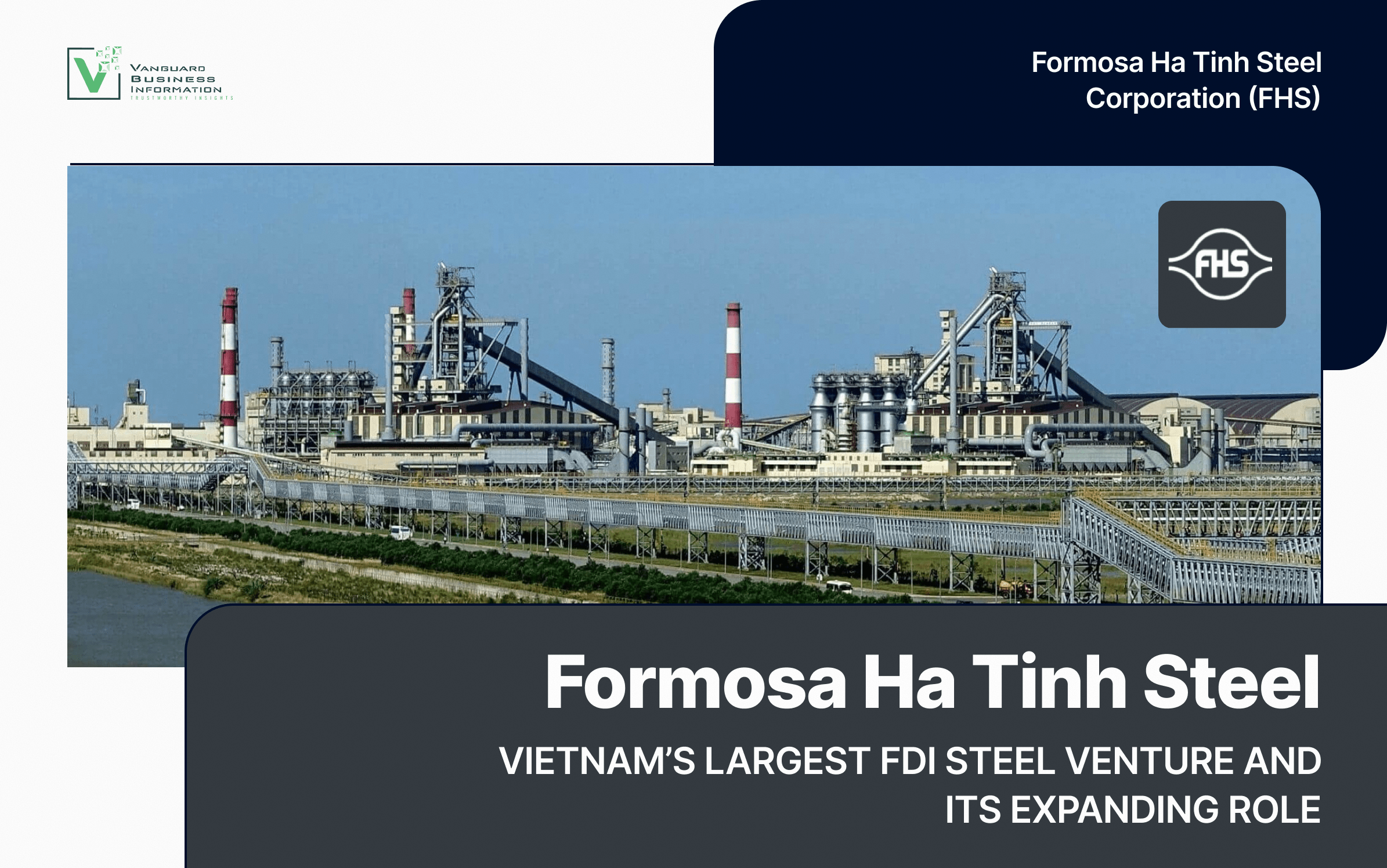Published Sep 2025
Formosa Ha Tinh Steel Corporation: Vietnam’s Largest FDI Steel Venture and Its Expanding Role
Formosa Ha Tinh Steel Corporation (FHS) is Vietnam’s largest foreign-invested steel project, operating a massive integrated mill in the heart of Ha Tinh Province. Backed by over USD 11 billion in capital from Taiwan’s Formosa Plastics Group, FHS is reshaping Vietnam’s industrial landscape with world-class infrastructure, deep-sea port access, and full-cycle steel production. Despite past environmental controversies and ongoing legal challenges, the company continues to expand.

Introduction: An Industrial Powerhouse in Central Vietnam
Formosa Ha Tinh Steel Corporation (FHS) is one of the most significant foreign direct investment (FDI) projects in Vietnam’s industrial history. It is located in the Vung Ang Economic Zone in Ha Tinh Province. With its vast integrated operations, FHS is a steel producer and a central player in the country’s economic development and heavy industry infrastructure.
Established in June 2008, the company is legally registered as Công ty TNHH Gang Thép Hưng Nghiệp Formosa Hà Tĩnh and operates as a one-member limited liability company. It is wholly owned by Formosa Ha Tinh (Cayman) Limited, a subsidiary of Taiwan’s powerful Formosa Plastics Group, a diversified conglomerate active in petrochemicals, steel, and electronics.
FHS was envisioned to transform Vietnam from a steel-importing country into a self-reliant and exporting steel hub, serving both domestic demand and Southeast Asian markets.
Corporate Scale, Capital Investment, and Ownership
FHS has attracted enormous capital since its inception. As of 2024:
- Charter Capital: USD 4.81 billion
- Paid-up Capital: USD 4.86 billion
- Total Investment Value: Estimated at over USD 11 billion, making it one of the most significant FDI projects in Vietnam
FHS's ownership structure is straightforward: it is 100% foreign-owned, with its parent company based in the Cayman Islands, under the Formosa Plastics Group umbrella. This structure allows the company to enjoy autonomy while operating under Vietnamese investment and business regulations.
Operations and Integrated Industrial Infrastructure
The Formosa Ha Tinh Integrated Steel Mill is a massive, vertically integrated facility capable of producing steel from raw material to finished on-site products. The complex includes:
- Blast furnace systems
- Coke and sintering plants
- Steel refining and rolling mills
- Power generation units
- Water treatment and environmental management facilities
- Private port infrastructure for import/export logistics
In addition to steel production, the company is registered for a wide range of industrial activities:
- Waste management and recycling
- Electricity generation and distribution
- Manufacturing of chemicals, cement, and non-metallic products
- Logistics, warehousing, and property operations
- Water supply and environmental services
This ecosystem allows FHS to reduce production costs, control supply chains, and optimize long-term output while contributing heavily to industrialization in central Vietnam.
Financial Performance: Large-Scale Operation with Improving Margins
FHS continues to operate at a massive scale, and while it has faced financial losses in the past, recent data shows signs of operational improvement. Based on its financial results up to Fiscal Year Ending 2024:
|
Indicator |
2022 |
2023 |
2024 |
|
Total Assets |
USD 11.08 billion |
USD 10.53 billion |
USD 9.94 billion |
|
Equity |
USD 4.78 billion |
USD 4.25 billion |
USD 3.90 billion |
|
Sales Revenue |
USD 3.90 billion |
USD 3.84 billion |
USD 3.63 billion |
|
Net Profit (Loss) |
-USD 313.6 million |
-USD 641.5 million |
-USD 548.1 million |
|
Working Capital |
— |
— |
-USD 875.78 million |
While the company recorded a net loss of USD 548 million in 2024, it represents a 14.56% improvement compared to 2023, showing a shift toward financial stabilization. Revenues declined slightly amid global steel price fluctuations, but the company remains focused on optimizing cost structures and increasing efficiency.
Leadership and Workforce
FHS is led by:
- Mr. Chang, Fu-Ning – Chairman
- Mr. Chen, Chun-Liang – General Director
Both are Taiwanese nationals with decades of experience in heavy industry. The company employs approximately 6,800 workers, including Vietnamese technicians, engineers, and foreign experts, contributing directly to job creation and skills transfer in the region.
Strategic Advantages in Vietnam’s Steel Sector
Vietnam's steel industry has expanded rapidly, fueled by public infrastructure spending, private construction, and rising industrial demand. FHS plays a pivotal role in this growth, offering several distinct advantages:
- Geographic Location: Its base in Ha Tinh offers deep-water port access, proximity to raw material imports, and logistic routes to central and northern Vietnam.
- Integrated Model: Few steel mills in the region offer such vertical integration, which allows FHS to reduce reliance on third parties and stabilize production quality.
- Trade Opportunities: With Vietnam participating in trade agreements like CPTPP, EVFTA, and RCEP, FHS is well-positioned to export steel under favorable tariffs.
- Domestic Demand: Vietnam’s urbanization and industrialization push long-term steel demand higher, providing a solid foundation for growth.
Environmental Legacy and Legal Challenges
Despite its economic role, FHS is still linked to one of Vietnam's most serious environmental disasters. In April 2016, wastewater from its Ha Tinh plant caused widespread marine life death along four coastal provinces. The disaster devastated fishing communities and led to mass protests.
FHS accepted responsibility and paid the Vietnamese government USD 500 million in compensation. However, the issue sparked international attention and legal actions that continue today.
Taiwan Lawsuit and Transnational Accountability
In 2019, nearly 8,000 Vietnamese victims filed a lawsuit in Taiwan, seeking direct accountability from Formosa Plastics Group and affiliated companies. While Taiwan’s courts initially rejected the case on jurisdictional grounds, the plaintiffs have appealed, and the matter remains unresolved.
Legal scholars and human rights organizations view the case as a landmark test of transnational corporate accountability, especially for environmental damages committed abroad by multinational corporations.
The plaintiffs face procedural and diplomatic hurdles, including challenges of notarization and the power of attorney. NGOs have raised concerns about access to justice, citing intimidation and a lack of legal infrastructure for transnational victims.
Continued Development, Despite Setbacks
Formosa Ha Tinh Steel is still growing despite legal challenges and financial volatility. It continues to expand operations, develop infrastructure, and benefit from Vietnam’s favorable investment policies.
Notably:
- FHS receives land use incentives and tax breaks under the Vung Ang Economic Zone scheme.
- Its power and logistics autonomy shield it from supply disruptions.
- While applying tighter environmental oversight, the Vietnamese government has continued supporting FDI in heavy industry.
Looking forward, the company is exploring ways to improve operational efficiency, reduce emissions, and align with global green steel trends, especially as ESG (Environmental, Social, Governance) becomes a primary concern for international buyers.
Conclusion: A Pillar of Vietnam’s Industrial Future
Formosa Ha Tinh Steel Corporation is more than just a steel mill — it symbolizes Vietnam’s integration into global industrial supply chains. Despite early struggles, the company is on a trajectory of stabilization and expansion, backed by world-class infrastructure, strategic positioning, and long-term FDI commitment.
Its past environmental failures remain a significant part of its story, and legal proceedings are ongoing. Yet, FHS continues to invest, produce, and contribute to the economic transformation of central Vietnam.
As global supply chains shift and Southeast Asia emerges as a new manufacturing frontier, FHS stands as a cornerstone of Vietnam’s heavy industry ambitions — one that must balance growth, responsibility, and transparency in the years ahead.


